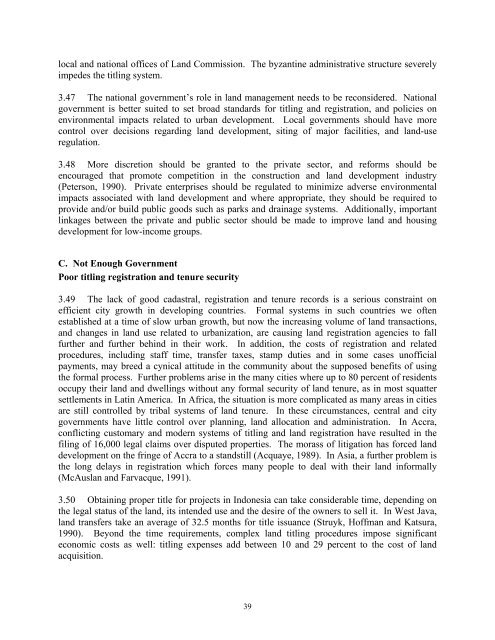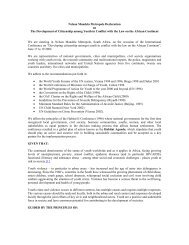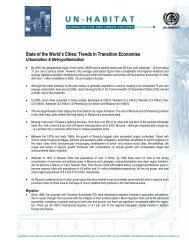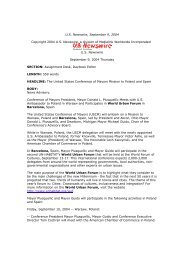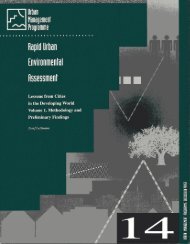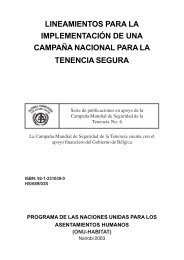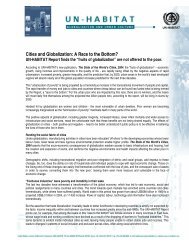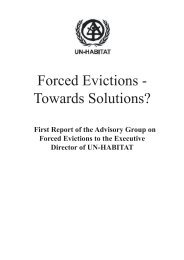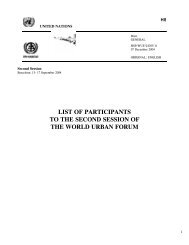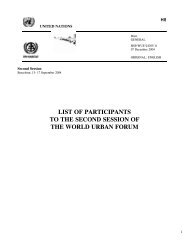a framework for reforming urban land policies in ... - UN-HABITAT
a framework for reforming urban land policies in ... - UN-HABITAT
a framework for reforming urban land policies in ... - UN-HABITAT
Create successful ePaper yourself
Turn your PDF publications into a flip-book with our unique Google optimized e-Paper software.
local and national offices of Land Commission. The byzant<strong>in</strong>e adm<strong>in</strong>istrative structure severely<br />
impedes the titl<strong>in</strong>g system.<br />
3.47 The national government’s role <strong>in</strong> <strong>land</strong> management needs to be reconsidered. National<br />
government is better suited to set broad standards <strong>for</strong> titl<strong>in</strong>g and registration, and <strong>policies</strong> on<br />
environmental impacts related to <strong>urban</strong> development. Local governments should have more<br />
control over decisions regard<strong>in</strong>g <strong>land</strong> development, sit<strong>in</strong>g of major facilities, and <strong>land</strong>-use<br />
regulation.<br />
3.48 More discretion should be granted to the private sector, and re<strong>for</strong>ms should be<br />
encouraged that promote competition <strong>in</strong> the construction and <strong>land</strong> development <strong>in</strong>dustry<br />
(Peterson, 1990). Private enterprises should be regulated to m<strong>in</strong>imize adverse environmental<br />
impacts associated with <strong>land</strong> development and where appropriate, they should be required to<br />
provide and/or build public goods such as parks and dra<strong>in</strong>age systems. Additionally, important<br />
l<strong>in</strong>kages between the private and public sector should be made to improve <strong>land</strong> and hous<strong>in</strong>g<br />
development <strong>for</strong> low-<strong>in</strong>come groups.<br />
C. Not Enough Government<br />
Poor titl<strong>in</strong>g registration and tenure security<br />
3.49 The lack of good cadastral, registration and tenure records is a serious constra<strong>in</strong>t on<br />
efficient city growth <strong>in</strong> develop<strong>in</strong>g countries. Formal systems <strong>in</strong> such countries we often<br />
established at a time of slow <strong>urban</strong> growth, but now the <strong>in</strong>creas<strong>in</strong>g volume of <strong>land</strong> transactions,<br />
and changes <strong>in</strong> <strong>land</strong> use related to <strong>urban</strong>ization, are caus<strong>in</strong>g <strong>land</strong> registration agencies to fall<br />
further and further beh<strong>in</strong>d <strong>in</strong> their work. In addition, the costs of registration and related<br />
procedures, <strong>in</strong>clud<strong>in</strong>g staff time, transfer taxes, stamp duties and <strong>in</strong> some cases unofficial<br />
payments, may breed a cynical attitude <strong>in</strong> the community about the supposed benefits of us<strong>in</strong>g<br />
the <strong>for</strong>mal process. Further problems arise <strong>in</strong> the many cities where up to 80 percent of residents<br />
occupy their <strong>land</strong> and dwell<strong>in</strong>gs without any <strong>for</strong>mal security of <strong>land</strong> tenure, as <strong>in</strong> most squatter<br />
settlements <strong>in</strong> Lat<strong>in</strong> America. In Africa, the situation is more complicated as many areas <strong>in</strong> cities<br />
are still controlled by tribal systems of <strong>land</strong> tenure. In these circumstances, central and city<br />
governments have little control over plann<strong>in</strong>g, <strong>land</strong> allocation and adm<strong>in</strong>istration. In Accra,<br />
conflict<strong>in</strong>g customary and modern systems of titl<strong>in</strong>g and <strong>land</strong> registration have resulted <strong>in</strong> the<br />
fil<strong>in</strong>g of 16,000 legal claims over disputed properties. The morass of litigation has <strong>for</strong>ced <strong>land</strong><br />
development on the fr<strong>in</strong>ge of Accra to a standstill (Acquaye, 1989). In Asia, a further problem is<br />
the long delays <strong>in</strong> registration which <strong>for</strong>ces many people to deal with their <strong>land</strong> <strong>in</strong><strong>for</strong>mally<br />
(McAuslan and Farvacque, 1991).<br />
3.50 Obta<strong>in</strong><strong>in</strong>g proper title <strong>for</strong> projects <strong>in</strong> Indonesia can take considerable time, depend<strong>in</strong>g on<br />
the legal status of the <strong>land</strong>, its <strong>in</strong>tended use and the desire of the owners to sell it. In West Java,<br />
<strong>land</strong> transfers take an average of 32.5 months <strong>for</strong> title issuance (Struyk, Hoffman and Katsura,<br />
1990). Beyond the time requirements, complex <strong>land</strong> titl<strong>in</strong>g procedures impose significant<br />
economic costs as well: titl<strong>in</strong>g expenses add between 10 and 29 percent to the cost of <strong>land</strong><br />
acquisition.<br />
39


